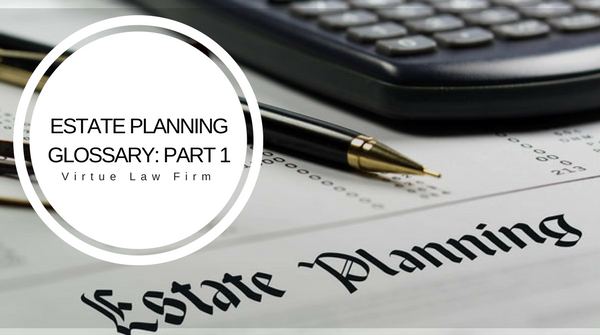You probably already know what a will is, but you may not know a lot of the other aspects of Scottsdale estate planning or the terms that are used to discuss it. As a result, you may find yourself a little lost when you start talking to an estate planning lawyer who’s asking you questions like, “Who do you want to name as your executor?” or “Do you want to create a trust for your children?”

A good estate lawyer in Scottsdale Arizona will take the time to explain all these terms to you, but you may end up paying more if you are paying by the hour. To make things a little easier, we’ve put together some of the most common estate planning terms we use when meeting with clients in our Arizona offices. You can review these terms before you come in for a consultation so that you can spend more time on substantial questions and conversations about your estate.
Basis
The basis is what you paid for an asset, such as your home or a piece of fine art. When you are determining tax obligations, the current value of that asset will be compared to the basis. The gain or loss will be factored into tax calculations.
It is important to know the basis for all assets since your beneficiaries will have to pay taxes on these assets, as well, when they inherit them.
Community Property

When you get married, any assets you acquire become community property, meaning that they belong to both you and your spouse. If you die or become divorced, your spouse will have rights to half of those assets. Even if you want to give everything you own to your children when you die, for example, it will only be half of what you own with your spouse (unless your spouse has also died).
Conservator
A conservator is a person who is assigned to manage the affairs of a person who is unable to do so themselves, either because they are mentally or physically unable to do so or because they are a minor and are not legally allowed to. This person can also be referred to as a guardian.
Disclaim
To disclaim something is to refuse to accept an inheritance or gift given you in a will. If you disclaim something, it will go to the next person named in the will or identifying as having the right to it by law, which would usually be the next of kin.
Estate

Everyone has an estate, even if they feel like they have nothing to leave behind. The term “estate” simply refers to everything you own and owe. Assets could be things like your home, car, or even just your furniture and clothes. Debts are anything you owe, such as credit card or medical debt, mortgages, and so on.
It is important that you create a will so that people know what to do with your assets (if there are any) and your debts (if there are any). Otherwise, the courts will have to step in and decide.
Fiduciary
A fiduciary is someone who has the legal right to act for another’s benefit. In estate planning, a fiduciary is often a trustee.
Homestead Exemption
You can protect part of your home from being sold to satisfy debts with a homestead exemption. This exemption is only available while you are living. Once you die, all of your assets can be sold to satisfy debtors.
Liquid Assets
Liquid assets are those that can be easily converted into cash, such as actual cash you have in savings or stocks and bonds that can be quickly sold.
Living Trust
A living trust assigns power to an entity to manage your assets while you are still alive. The trust is set up with instructions on how to distribute your assets once you die. Creating a living trust helps to keep your assets out of probate if you become incapacitated, such as from a sudden illness or accident. A living trust is irrevocable, which means it cannot be revoked or changed once it is set up.
Living Will
A living will tells healthcare professionals that you do not want to be kept alive by artificial means if you develop a terminal illness or injury. Having a living will ensures that your wishes are respected when you are unable to express them for yourself.
Per Capita
To assign assets to beneficiaries “per capita” means that you want them divided equally be each person. Choosing to give out assets per capita ensures that no one gets less because they are from a different generation.
The terms around Arizona estate planning can seem confusing, but your AZ estate lawyer will help you through it all. Whether you are interested in simple will and trust or you have more complex estate planning needs, it is important that you meet with an experienced estate planning lawyer to get the right documents in place and to get your assets to your heirs without any problems.
Virtue Law is ready to help you. We offer a variety of estate planning services, including wills and trust, guardianships, living wills, and more. We will help you understand all the issues pertaining to your case and give you feedback on how best to protect your assets for your heirs. Contact us in Arizona today to begin talking about your estate planning needs.
Published By:
Virtue Law Firm
Scottsdale, AZ 85251
Phone: 480-941-0710
Website: arizonaestatelawyer.com
Email: [email protected]





